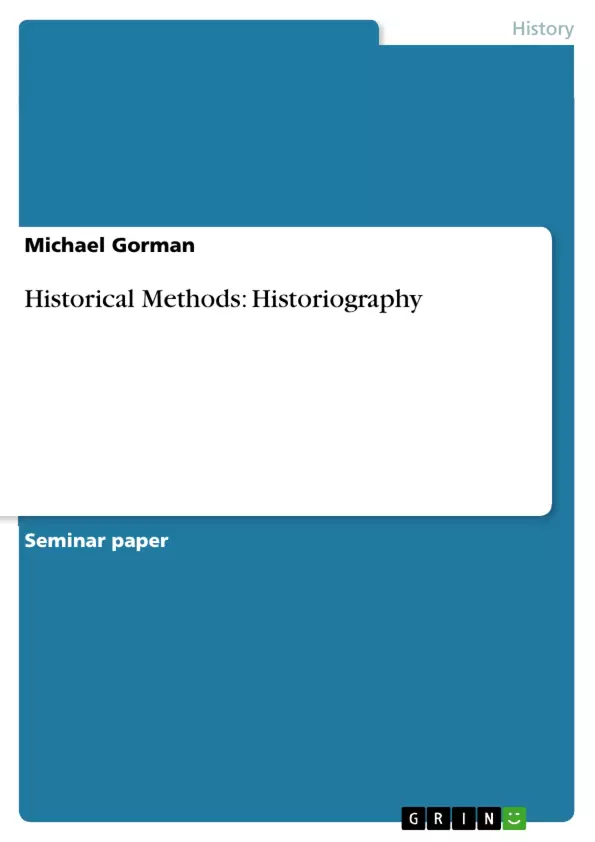The changes in the practice of history, in regard to how historians approach and understand the past, have come from many directions, producing new theories and new perspectives of not only what has happened, but also what history is. Over time, these changes moved history out of the realm of antiquarianism and gave historical research a purpose; with each new theory and methodology our understanding of the past gains new perspectives and creates inclusive dialogue in our society.
Inhaltsverzeichnis (Table of Contents)
- Historical Methods: Historiography
- The History of Studying History
- Karl Marx's Revolutionary Ideas
- Beyond Marx: The Power of Culture
- Neo-Marxism and the Shortcomings of Class
- The Rise of Gender Studies
- The Complications of Gender
Zielsetzung und Themenschwerpunkte (Objectives and Key Themes)
This text provides a comprehensive exploration of the evolution of historical methods, focusing on how historians approach and understand the past. The work examines key theories and perspectives that have shaped our understanding of history, moving it beyond antiquarianism and towards a more purposeful and inclusive dialogue in society.
- The history of studying history and the development of historiography
- The impact of Karl Marx's theories on historical analysis
- The significance of culture and its relationship to historical understanding
- The shortcomings of Marxist theories in relation to race, gender, and other social categories
- The emergence and development of gender studies and its impact on historiography
Zusammenfassung der Kapitel (Chapter Summaries)
- Historical Methods: Historiography: This chapter introduces the history of studying history, tracing its evolution from ancient Greece to the present day. It discusses the development of historiography from its origins in deciphering myth and fact to the emergence of more sophisticated methodologies based on evidence and scientific rigor.
- Karl Marx's Revolutionary Ideas: This chapter explores the groundbreaking theories of Karl Marx and their impact on the study of history. Marx's focus on the human relationship with production and consumption shifted the lens of historical analysis away from non-material concepts like world spirit and towards a more materialist perspective. This chapter outlines how Marx's framework provides a visible and physical constant for understanding past societies.
- Beyond Marx: The Power of Culture: This chapter examines the limitations of Marx's theories, specifically their failure to fully account for the significant role of culture in shaping history. It argues that non-material aspects of society, such as cultural norms, values, and beliefs, have a profound influence on historical events and processes.
- Neo-Marxism and the Shortcomings of Class: This chapter delves into the work of neo-Marxists like David Roediger, who built upon Marx's theories but expanded them to address issues of race and gender. It explores the shortcomings of Marxist theories in prioritizing class over race and gender, highlighting the need for a more inclusive historical perspective.
- The Rise of Gender Studies: This chapter examines the emergence of women's studies and gender studies in the 20th century, as a response to the limitations of existing historical methodologies in addressing issues of gender and sexuality. It discusses the work of Joan Scott, a pioneer in gender studies, and her contribution to expanding the scope of historical analysis to include the social, cultural, and political dimensions of gender.
- The Complications of Gender: This chapter delves into the complexities of gender as a category of historical analysis, exploring the debates surrounding its definition, application, and limitations. It examines the work of Afsaneh Najmabadi, who critiques Joan Scott's work for its assumption of a universal understanding of gender and sexuality, and argues for the need to consider the historical context and cultural specificity of these concepts.
Schlüsselwörter (Keywords)
This text explores the key concepts and themes in historiography, including: historical methods, historiography, Karl Marx, Marxist theory, materialist history, culture, race, gender, gender studies, women's studies, Joan Scott, Afsaneh Najmabadi, power, social relations, historical analysis.
Frequently Asked Questions
What is Historiography?
Historiography is the study of the methods of historians in developing history as an academic discipline, and by extension, is any body of historical work on a particular subject.
How did Karl Marx influence historical analysis?
Marx shifted historical focus toward a materialist perspective, emphasizing the human relationship with production and consumption as the primary driver of societal change, rather than abstract ideas.
What are the limitations of traditional Marxist history?
Traditional Marxism often prioritized class struggle above all else, sometimes failing to account for the significant influence of culture, race, and gender in shaping historical events.
Who is Joan Scott and why is she important in historiography?
Joan Scott is a pioneer in gender studies who argued that gender is a primary way of signifying relationships of power. Her work expanded historical analysis to include social and cultural dimensions of gender.
How has the practice of history changed over time?
History has moved from antiquarianism (collecting facts for their own sake) toward using diverse theories and methodologies to create a more inclusive and purposeful understanding of the past.
What is the significance of culture in modern historical methods?
Modern historians recognize that non-material aspects of society, such as cultural norms, beliefs, and values, are essential for a complete understanding of historical processes and social relations.
- Citar trabajo
- M.A. Michael Gorman (Autor), 2022, Historical Methods: Historiography, Múnich, GRIN Verlag, https://www.grin.com/document/1246980



